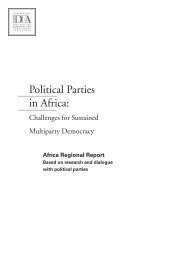Background Document - Danish Institute for Parties and Democracy
Background Document - Danish Institute for Parties and Democracy
Background Document - Danish Institute for Parties and Democracy
You also want an ePaper? Increase the reach of your titles
YUMPU automatically turns print PDFs into web optimized ePapers that Google loves.
“The problem <strong>and</strong> challenges facing humanity are global but occur <strong>and</strong> have<br />
to be dealt with at the local level. Women have the equal right to freedom from<br />
poverty, discrimination, environmental degradation <strong>and</strong> insecurity. To fight these<br />
problems <strong>and</strong> to meet the challenges of sustainable human development, it is crucial<br />
that women be empowered <strong>and</strong> involved in local government as decision makers,<br />
planners <strong>and</strong> managers.”<br />
While the participation of women in local politics has been poorly documented<br />
till specific studies were commissioned such as the UNESCO study of 2000 to document<br />
<strong>and</strong> increase awareness of the issue in Asia Pacific <strong>and</strong> the study conducted by<br />
the Council of European municipalities <strong>and</strong> regions of 2008, it appears that despite<br />
being under represented in positions of power worldwide, women across the world are<br />
better represented in local politics <strong>and</strong> government as compared to the national one.<br />
We now examine why this is so more closely.<br />
ENABLING FACTORS<br />
The basic factor that has enabled women to access local politics more felicitously as<br />
compared to national politics is because participation in local government is probably<br />
easier <strong>for</strong> women to accommodate in their daily lives along with their multiple roles<br />
in the family, household <strong>and</strong> employment. Local government is also seen as more accessible<br />
in terms of the number of positions available <strong>and</strong> perceived to be less threatening<br />
as it is an extension of the work they already do in the community.<br />
“Women councillors can make a difference<br />
<strong>for</strong> the women they represent, <strong>and</strong> could introduce<br />
a feminized view to local governance more broadly,<br />
something that has the potential to<br />
aid all constituents.”<br />
Once the process of women being elected at the local level gained momentum<br />
the environment became more open <strong>for</strong> them, <strong>and</strong> to women’s issues being on the<br />
agenda. Of course much of this culture of acceptance in the last two decades has been<br />
prompted by an active women’s movement <strong>and</strong> by statutory requirements <strong>for</strong> quotas<br />
of women. 5<br />
The report ‘Comparative study Women in Local Government in Asia <strong>and</strong> the Pacific’<br />
has identified some key factors that create an enabling environment <strong>for</strong> women<br />
to enter local politics. These are:<br />
Positive laws, practices <strong>and</strong> initiatives that ensure participation including statutory<br />
provisions guaranteeing women the right to participate, signing of CEDAW; national<br />
policies <strong>and</strong> programme such as specific women’s departments <strong>and</strong> plans; participatory<br />
local government structures even if these are not specifically gender specific;<br />
participation of NGOs in encouraging women to participate; training to participate;<br />
regional <strong>and</strong> international conferences that provide support, training <strong>and</strong> initiatives<br />
that increase the number of women; encouragement by women within local government<br />
to other women to participate <strong>and</strong> support them <strong>and</strong> collection of data that enhances<br />
the visibility of women.<br />
5 Comparative study of Women in Local Government in Asia <strong>and</strong> the Pacific.<br />
WOMEN IN POLITICS DANISH INSTITUTE FOR PARTIES AND DEMOCRACY PAGE 26
















